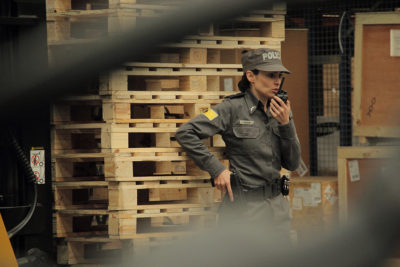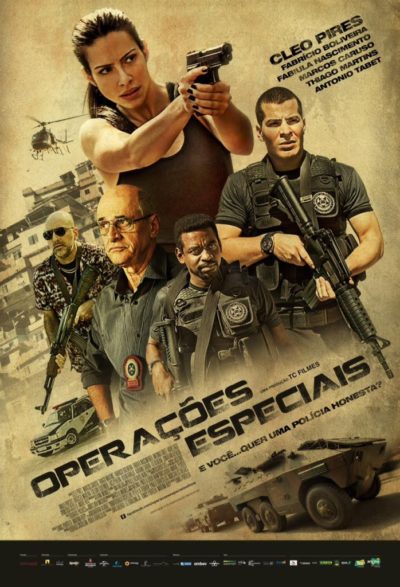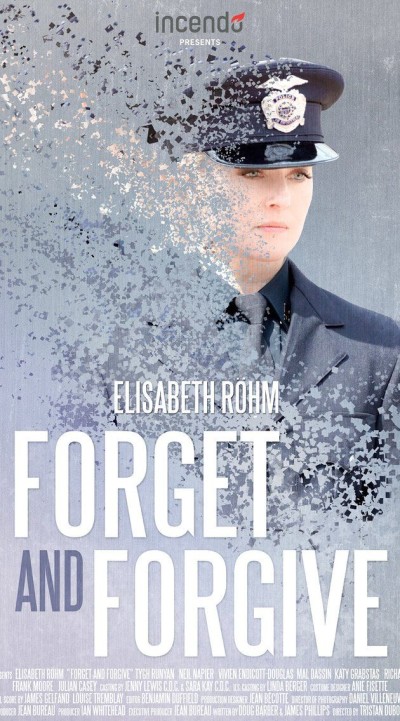★★½
“Stuck in a corner.”
 You’re in deep in Devil’s Corner
You’re in deep in Devil’s Corner
And you already realize it’s hard to get out.
What would you do if there’s no place to run
Sharpen your senses and defend yourself well
In Devil’s Corner, walking towards love
Dodging bullets and risking your heart
It’s so hard to escape from Devil’s Corner
Defying death I came here to fight
And to love
Thus goes the peppy pop ditty which plays over the opening credits of this Colombian telenovela. It stars Ana Serradilla, whom we previously saw as the heroine of La Viuda Negra. Here, she’s on the other side of the law, playing cop Ana García. She wants to be assigned to the special operations group. But her temper gets the best of her when she’s given a surreptitious test, interviewing a suspect who’s actually a policeman, and is deliberately trying to provoke her.
Fortunately, she gets a second chance to make a first impression, and is inserted in an undercover role to the aptly-named “La esquina del diablo” – the Devil’s corner. It’s a no-go zone for police, a ghetto perched high up on the hills overlooking the city. The area is controlled with an iron hand by the Velasco family, led by patriarch Angel (Tappan); they run drugs and other criminal activities, and have been a thorn in the side of the local authorities for years. Local cop Eder Martin (de Miguel) sends Ana into the area as a social worker, to gather information, after a helicopter crash supposedly kills Angel. However, it quickly turns out this was merely a ruse by the boss, to get the cops off his back. Can Ana embed herself deeply into the local community to complete her mission?
That’s just one – possibly not even the main one – of a number of plot threads which are woven into the fabric of the 70 episodes. Additional elements include:
- Angel’s second-in-command, Yago (Pernia), who was a childhood friend of Eder
- Angel’s son, Angelito, who is an ambitious loose cannon with psychopathic tendencies
- Eder’s relationship with the mayor’s daughter, and its conflict with the growing attraction to Ana
- Meanwhile, Ana’s gradual realization that Yago may not be as bad an apple as he seems
- The mayor’s political aspirations and presidential campaign
- Yago’s son is a promising football player, but is also on the verge of being recruited by Angelito
- The other undercover cop, who befriends Angelito in jail and helps him escape
- The mysterious “He”, a rival crime boss who inhabits the upper echelon of the city’s elite
- The serial killer who is leaving a trail of women’s corpses, tattooed with numbers on their shoulders
 Phew. This cornucopia of plot-lines likely both the series’s biggest strength and its greatest weakness. There’s no doubt it’s actually very well-handled by the writers and cast: even the relatively minor characters are given an impressive amount of depth, and the script never gets jumbled or confused. This is a sharp contrast to Camelia la Texana, the show I’m currently watching: you don’t so much follow the plot, as desperately cling to it, as various groups of sideburn-wearing people scheme against each other. It’s also a contrast, in another way, to Viuda Negra, which was unashamedly about Griselda Blanco. In this case, the breadth of focus inevitably leads to a dilution of why we’re here, with poor Ana often sidelined.
Phew. This cornucopia of plot-lines likely both the series’s biggest strength and its greatest weakness. There’s no doubt it’s actually very well-handled by the writers and cast: even the relatively minor characters are given an impressive amount of depth, and the script never gets jumbled or confused. This is a sharp contrast to Camelia la Texana, the show I’m currently watching: you don’t so much follow the plot, as desperately cling to it, as various groups of sideburn-wearing people scheme against each other. It’s also a contrast, in another way, to Viuda Negra, which was unashamedly about Griselda Blanco. In this case, the breadth of focus inevitably leads to a dilution of why we’re here, with poor Ana often sidelined.
This is a shame, since the heroine here is shown in the first episode, as fully capable of single-handedly taking out and/or down multiple villains with her skills. The mission here is much less direct: it’s very much undercover intelligence-gathering. She can’t kick ass, because that is not what social workers do: if she did, anyone who saw it would have cause to suspect Ana’s real identity and mission, immediately becoming part of the problem. So instead, there’s a lot more skulking around, trying to earn the trust of Eder, and narrow escapes from being caught by Velasco’s gang. After what we saw at the beginning, this passive approach seems like a sad waste of her law-enforcement talents.
This is the main reason for the relatively low score above. For in some ways, it’s the best of the shows I’ve seen, in terms of combining characters and plots in an engaging way. I’m impressed with the non-specific nature of the location, mentioning no particular country or city. The sharp divide between rich and poor, with the latter living in ghettos run by a largely criminal element, reminded me of the Rio favelas – I highly recommend you watch the amazing Elite Squad if you want a glimpse of the hellish life there. But I would imagine it’s equally likely to be Colombia, since that’s where the series was actually shot. The series does well too, in portraying the moral grey-scale: between Ana at one end and Angelito at the other, most making choices based on pragmatism rather than idealism.
 There are a lot of interesting supporting characters: not so much Eder and Yago, who are fairly cookie-cutter in terms of being opposing romantic heroes, with dark, troubled (and somewhat shared) pasts. It’s mostly on the fringes of Velasco’s gang that all the fun is to be found. Cachalote (Julián Caicedo) is a burly thug with a surprisingly soft heart – he has an unrequited crush on the mayor’s daughter, formed during her kidnapping. Meteoro (Erick Leonardo Cuellar) is the gang’s drug chemist, though he looks and acts like a methed-up version of Giorgio Tsoukalos, from the Ancient Aliens show. Most notable of all is Michelle (Estefania Piñeres, right), a hard-nosed barrio brat who is more than capable of holding her own in the tough environment, and is ferociously loyal to her boss. She would have enough stories to tell for her own, lengthy series, I’ve no doubt about that.
There are a lot of interesting supporting characters: not so much Eder and Yago, who are fairly cookie-cutter in terms of being opposing romantic heroes, with dark, troubled (and somewhat shared) pasts. It’s mostly on the fringes of Velasco’s gang that all the fun is to be found. Cachalote (Julián Caicedo) is a burly thug with a surprisingly soft heart – he has an unrequited crush on the mayor’s daughter, formed during her kidnapping. Meteoro (Erick Leonardo Cuellar) is the gang’s drug chemist, though he looks and acts like a methed-up version of Giorgio Tsoukalos, from the Ancient Aliens show. Most notable of all is Michelle (Estefania Piñeres, right), a hard-nosed barrio brat who is more than capable of holding her own in the tough environment, and is ferociously loyal to her boss. She would have enough stories to tell for her own, lengthy series, I’ve no doubt about that.
However, as an action heroine series, it’s undeniably a disappointment: I was expecting much more focus on the central character, based both on Negra and the first episode. And, indeed, much more action. As a regular TV show, it would deserve a higher rating, likely a full star better, since I genuinely did enjoy it. It just isn’t quite the fit for the site which I was hoping to see.
Star: Ana Serradilla, Miguel de Miguel, Gregorio Pernía, Christian Tappan





 This is officially characterized (though not in the cover copy) as the fourth book of the author’s Doucet series. However, that nominal “series” is apparently very loosely connected, only by having main or other characters from the fictional Doucet clan; and a Doucet appears in this novel, though not as the protagonist. Our protagonists are sheriff’s deputies Nick Fourcade, a detective, and Annie Broussard, a uniformed deputy who’d like to be a detective. (The book is also counted as the opener of the Broussard and Fourcade series, which is apparently more connected; but it has a resolution to the mysteries involved in this volume, while leaving things open for new ones.)
This is officially characterized (though not in the cover copy) as the fourth book of the author’s Doucet series. However, that nominal “series” is apparently very loosely connected, only by having main or other characters from the fictional Doucet clan; and a Doucet appears in this novel, though not as the protagonist. Our protagonists are sheriff’s deputies Nick Fourcade, a detective, and Annie Broussard, a uniformed deputy who’d like to be a detective. (The book is also counted as the opener of the Broussard and Fourcade series, which is apparently more connected; but it has a resolution to the mysteries involved in this volume, while leaving things open for new ones.) There seems to have been a sudden surge of gynocentric takes on Taken (as it were), with first
There seems to have been a sudden surge of gynocentric takes on Taken (as it were), with first  Based on the title and synopsis, I was expecting something like a Lifetime TV Movie. A mother frantically searching for her abducted child in a foreign location, before they can be sold off to some rich Arab, would seem right up their alley. [Though of course, this kind of thing has long been a popular subject for exploitation, to the point where the Hays Code of the thirties had explicitly to ban movies about “white slavery”] It’s a good deal grittier and harder hitting than that, though could have done with much better explanation of why this momma bear is so ferocious – among a number of other aspects.
Based on the title and synopsis, I was expecting something like a Lifetime TV Movie. A mother frantically searching for her abducted child in a foreign location, before they can be sold off to some rich Arab, would seem right up their alley. [Though of course, this kind of thing has long been a popular subject for exploitation, to the point where the Hays Code of the thirties had explicitly to ban movies about “white slavery”] It’s a good deal grittier and harder hitting than that, though could have done with much better explanation of why this momma bear is so ferocious – among a number of other aspects. This production had a long, convoluted and quite interesting path to the screen. While Lazenby was always on board, the original plan was for him to be a Western bad guy, going up against Bruce Lee and Sonny Chiba. But Lee’s death – oddly, he was supposed to have had dinner with Lazenby that night – resulted in Chiba quitting, and Warner Bros then also backed out of their worldwide distribution deal. It was reworked as a much smaller film, at less than one-tenth the original budget (although at around $850,000, was still very expensive for the time, location and genre), with Lazenby now teaming up with Angela Mao.
This production had a long, convoluted and quite interesting path to the screen. While Lazenby was always on board, the original plan was for him to be a Western bad guy, going up against Bruce Lee and Sonny Chiba. But Lee’s death – oddly, he was supposed to have had dinner with Lazenby that night – resulted in Chiba quitting, and Warner Bros then also backed out of their worldwide distribution deal. It was reworked as a much smaller film, at less than one-tenth the original budget (although at around $850,000, was still very expensive for the time, location and genre), with Lazenby now teaming up with Angela Mao. The Brazilian special police unit, known as BOPE (Batalhão de Operações Policiais Especiais) have a ferocious reputation for a hard-edged approach to its work. This is, likely, necessary for surviving the favelas (slums) of Rio in which they operate, going up against heavily-armed drug dealers. But with this also comes a “by any means necessary” approach, which has come in for criticism. They’ve been the topic of films before, most notably the incredible Elite Squad, which is an all-time classic of action cinema (and removed any chance of us attending the 2016 Olympics). It’s into this obviously macho environment, that rookie policewoman Francis (Pires) is dropped, and has to make her way.
The Brazilian special police unit, known as BOPE (Batalhão de Operações Policiais Especiais) have a ferocious reputation for a hard-edged approach to its work. This is, likely, necessary for surviving the favelas (slums) of Rio in which they operate, going up against heavily-armed drug dealers. But with this also comes a “by any means necessary” approach, which has come in for criticism. They’ve been the topic of films before, most notably the incredible Elite Squad, which is an all-time classic of action cinema (and removed any chance of us attending the 2016 Olympics). It’s into this obviously macho environment, that rookie policewoman Francis (Pires) is dropped, and has to make her way.
 This is confusing. For the IMDb
This is confusing. For the IMDb  Renowned for its influence on just about every subsequent cyberpunk entity, from The Matrix to Westworld, this also remains one of the classic anime movies, more than two decades after its release. The main problem though, is the translation of a densely-packed and heavily notated manga series by Masamune Shirow, into an 82-minute action feature. You’re left with something forced to cram the philosophical aspects into a couple of indigestible lumps – an approach certainly also adopted by the Wachowski Brothers.
Renowned for its influence on just about every subsequent cyberpunk entity, from The Matrix to Westworld, this also remains one of the classic anime movies, more than two decades after its release. The main problem though, is the translation of a densely-packed and heavily notated manga series by Masamune Shirow, into an 82-minute action feature. You’re left with something forced to cram the philosophical aspects into a couple of indigestible lumps – an approach certainly also adopted by the Wachowski Brothers. Beginning with a jokey caption stating “The producers of this movie are in no way admitting to the existence of PMS,” this is a rather uneven B-movie, which has a potentially interesting premise. Unfortunately, it then does not do enough with the concept.
Beginning with a jokey caption stating “The producers of this movie are in no way admitting to the existence of PMS,” this is a rather uneven B-movie, which has a potentially interesting premise. Unfortunately, it then does not do enough with the concept.